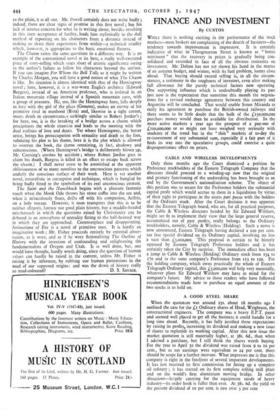FINANCE AND INVESTMENT
By CUSTOS
WHILE there is nothing exciting in the performance of the stock markets—most brokers are complaining of the dearth of business—the tendency towards improvement is impressive. It is certainly indicative of what in, Throgmorton Street is known as " better sentiment " that the recovery in prices is gradually being con- solidated and extended in face of all the obvious restraints on investment. Mr. Dalton has not yet shown his hand in the matter of an autumn budget, and winter, with its fuel problem, looms close ahead. That buying should exceed selling is, in all the circum- stances, a testimony to the toughness of investors, even after making full allowance for the purely technical factors now operating. One supporting influence which is undoubtedly playing its part just now is the expectation that sometime this month the negotia- tions for a revised exchange agreement between this country and Argentina will be concluded. That would enable Senor Miranda to ratify his agreement to purchase the British-owned railways and there seems to be little doubt that the bulk of the £15o,000,000 purchase money would then be available for distribution. In the more active markets a year ago the prospect of a pay-out of £too,000,000 or so might not have weighed very seriously with students of the trend but in the " thin" markets of to-day the re-investment of any substantial sum, especially if a fair part of it finds its way into the speculative groups, could exercise a quite disproportionate effect on prices.
CABLE AND WIRELESS DEVELOPMENTS
Only three months ago the Court dismissed a petition by Preference stockholders of the Eastern Telegraph Company that the directors should proceed to a winding-up now that the original and primary functioning of the undertaking has been brought to an end by the Government's nationalisation scheme. The object of this petition was to secure for the Preference holders the substantial capital profit which would accrue ty them in a liquidation by virtue , of their right to participate in the assets pari passu with the holders of the Ordinary stock. After the Court decision . it was apparent that the Eastern Telegraph board, who are, for all practical purposes, the Cable & Wireless directors headed by Sir Edward Wilshaw, might see fit to implement their view that the large general reserve, accumulated out of past profits, really belongs to the Ordinary stockholders, namely, Cable & Wireless (Holding). Such a move is now announced, Eastern Telegraph having declared a too per cent. tax free special dividend on its Ordinary capital, involving no less a sum than £5,000,000. This proposal is certain to be bitterly opposed by Eastern Telegraph Preference holders and it has certainly taken the City by surprise. The immediate effect has been a jump in Cable & Wireless (Holding) Ordinary stock from 154 to 170 and in the same company's Preference from 113 to no. For the holding company, which owns practically the whole of Eastern Telegraph Ordinary capital, this £5,000,000 will help very materially, whatever plans Sir Edward Wilshaw may have in mind for the company's future. My advice to those readers who have followed recommendations made here to purchase an equal amount of the two stocks is to hold on.
A GOOD STEEL SHARE
When the quotation was around 25s. about 18 months ago I outlined the case for the Li Ordinary shares of Head, Wrightson, the constructional engineers. The company was a heavy E.P.T. payer and seemed well placed to get all the business it could handle for a long time ahead. Recently, it has fully justified these expectations by raising its profits, increasing its dividend and making a new issue of shares to replenish its working capital. After this new issue the market quotation is still materially higher, at 38s. 6d., than when I advised a purchase, but I still think the shares worth buying. For the year to April 30 the dividend was raised from 9 to to per cent., but as net earnings were equivalent to 24 per cent. there should be scope for a further increase. What impresses me is that this company is right in the forefront of several important developments. It has just received its first commission for fitting up a complete oil refinery ; it has started on its first complete rolling mill plant and on the world's first aluminium moving bridge. In other directions—lre-gely catering for the equipment needs of heavy industry—its order book is fuller than ever. At 38s. 6d. the yield on the present dividend of to per cent. is just over 5 per cent


































 Previous page
Previous page